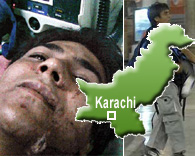 Paksitan ISI a Terrorist Organization
Paksitan ISI a Terrorist OrganizationThe United States on Sunday asked the ISI to sever all its ties with extremist's groups including al-Qaida, the Taliban and Lashkar-e-Taiba, which it called an "existential threat" to Pakistan itself.
ISI, which is having undeniable links with these terrorist groups, has been warned by the Obama Administration, which is more explicitly reflected in the new Af-Pak policy announced by US President Barack Obama on Friday, to set its house in order as soon as possible.
"What we need to do is try and help the Pakistanis understand these groups are now an existential threat to them and we will be there as a steadfast ally for Pakistan," US Defense Secretary Robert Gates told the Fox News today in an interview in which he clearly said that the ISI needs to cut its ties with extremists.
"They can count on us and they don't need that hedge," Gates said as he cited ISI's links specifically to the al-Qaida-linked Haqqani militant network and to the forces of warlord Gulbuddin Hekmatyar in Afghanistan.
It has been told in clear words, that cutting all ties with extremist elements means not only the Taliban and al Qaida related to Afghanistan or western Pakistan, but also those elements like LeT in Kashmir, as the US establishment has now realised and come to the conclusion that all these groups are linked together.
It should be seen as helping the US-led international community in fighting the war against terror and not providing any direct or indirect logistic or other support to these extremists' organisations, ISI has been told by the US.
Richard Holbrooke, the Special US Envoy for Pakistan and Afghanistan, said he along with the Central Command (CENTCOM) Chief General David Petraeus, sat down with the ISI chief (Lt Gen Shuja Pasha) when he was here recently and talked directly in all clear terms with him in this regard.
"It's a topic that is of enormous importance, because if there are links (between ISI and extremist elements) and if those continue and if it undermines the operations, obviously that would be very damaging to the kind of trust that we need to build," Petraeus told the PBS news in another interview.
"ISI really establ
 ished some of these organizations -- with our money, by the way, back in the days of the Mujahedin fighting against the Soviet invasion of Afghanistan. So those links were very strong. And some of them, I think, unquestionably do remember - or do remain to this day.
ished some of these organizations -- with our money, by the way, back in the days of the Mujahedin fighting against the Soviet invasion of Afghanistan. So those links were very strong. And some of them, I think, unquestionably do remember - or do remain to this day."It is much more difficult to tell at what level those links are still established, whether some of the contact is the contact of intelligence with sources or it is, indeed, warning. There are some cases, I think, that are indisputable in the past, and the fairly recent past, in which that appears to have taken place," he said.







